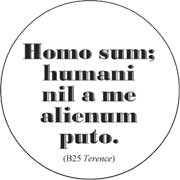It will reveal all of the assumptions and bits of knowledge you already do have (but might not know that you know). Chances are that thing you're interested in learning/writing about is something
you probably have at least a few facts and assumptions about. And it's probably a good thing for any writer is to get to take stock of the knowledge base they already have (regardless of how skewed).
For instance last week I was prompted to "write a celebration of the opposite sex". I have no idea when "opposite sex" even is to me as a person who identifies as both bisexual and genderqueer. I experience a bristle of discomfort whenever I'm asked to distinguish between (two) sexes/genders.
My gender and sexual identities are in many ways inherently against that sort of defining. But some parts of are still attached to those separations. Even though they aren't the parts of me I choose to express most of the time they still exist inside of me.
So I chose to explore what I knew the least about, how my masculinity relates to the supposedly opposite feminine folks. This is what came out when I gave that space to speak:
I don't want to be just one more guy writing creepy sonnets about Women
So it's a good thing I'm awful
at sonnets, because the slow-quick,
then whiplash that any small impact
dances through breast to nipple
makes my iambs incredibly tense.
As my heart double-dactyls I
imagine our chests pressed together
the way her nipples might drag
all their implications across my storyline,
until their hard milklessness tattoos
hunger through rib to lung to liver.
The lust in me she pricked
drops sudden into hip sockets
and opens the honest horror of its being:
I love women because overwhelm is what they're used to.
I love being cast as the stimuli that she will react to.
I get off on her ceding to my protagonism,
The sashay of her ponytail's enough to
set off my engine. Her eyelids
flick faster than any lip could
transmute the notion "come and get me.
I am aching to be got."She yields
and I develop my character all over her.
The lines I wrote are both earnest and satirical. I do enjoy embodying the sort of masculinity that requires femininity to be ancillary. But I also at the very same time I recognize how very damaging, fucked up, and prevalent this dynamic is. I see how it ruins lives.
As erotic as I find these assumptions they are false. "Real women have curves" the same way real women are all reactive, submissive, and only interested in cuddling after sex. In the way that one person's experiences doesn't fit into/reflect all the stereotypes associated with their cultural group.
As damaging and confining as these roles are to people of all genders, I still enjoy them. In the same way that I cannot consciously stop my self from having a panic attack, I cannot consciously or instantly change my own desires. And I refuse to apologize for my thoughts and fantasies.
Now this whole "heart wants what is wants" bit is absolutely not an excuse/free pass to behave in ways that hurt or dehumanize others. We all experience complex and often baffling desires and we all decide how to actualize or not actualize them. I have decided to try not to dehumanize others, but that doesn't mean I'm not interested in playing out dehumanizing roles with other consenting adults.
Acknowledging that contradiction is scary. And often takes some time (and some uninhibiting substances). While writing the above poem my body and pen resisted (there's another 3 stanzas I wrote before and during drafting it that critiqued/resisted the voice I was writing from).
We like to see ourselves as Good Guys always fighting the good fight with all our thoughts and desires. But none of us really is. In this sense the revolution starts with honest self-reflection; with realizing and recognizing one's own monstrous and dehumanizing impulses.
If we let go of needing ourselves to be Good we can stop denying our problematic impulses and desires. What's revealed in this process are the deeply ingrained biases and assumptions that live in our minds.
 |
It lets me know that my desires are participating in and benefiting from the male gaze. It also lets me know that I am not above the tantalizing effects of a power imbalance I'm on the luckier side of. It reminds me that parts of me enjoy and pine after being the oppressor.